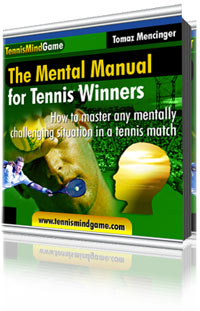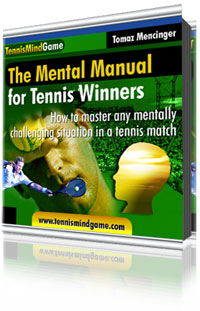| |
Tennis Psychology
A Winning Tennis Foundation
An Article on Tennis Psychology
by Tomaz Mencinger
A Winning Tennis Psychology is the difference between champions and all the rest.
Being a master in tennis psychology is usually a deciding factor for winning tournaments regardless of the level that you play. Mental toughness is important whether you play at a local club tournament or Wimbledon final – you need to handle all the pressure from playing a big match.
The psychology of tennis is based on sports and general psychology, and applied to tennis specifically. What you learn are not just tips and general advice, but much more effective methods of controlling your mind and state that you are in.
So what are these tennis psychology topics? Here's what you need to learn to become a winning tennis player:

- How to Concentrate
Many players have good concentration in the beginning of the match but then their level of focus starts to go up and down. The reasons can be outside events, pressure situations, emotional outbursts or just fatigue. You'll need to learn how to deal with these situations and keep your concentration high
even when these events happen.
- How to Control Arousal – Activation
Arousal means at the same time your emotions and your body energy. If your arousal – activation is too high, you are angry and you have too much energy (that’s why players throw acquets – release of energy…). And if your arousal is too low, you are frustrated and have low level of energy. Both states prevent high level of tennis play.
Learning to find the "ideal state" is the key in controlling your arousal and one of the most important aspects of tennis psychology.
- What can you control in a tennis match?
There are many things that you cannot control: wind, court conditions, opponents play, bad line calls and so on. If you put too much attention on these events, you get irritated or even upset. And yet the events don't change only your level of play drops dramatically.
By being focused on these events you waste your energy which could be used on elements that you can control – your attitude and effort, how you intend to play . . .
- How to Control Your Thinking
Negative thinking affects your body abilities – creating tension and it evokes negative feelings – emotions that cloud your judgment.
If you are aware of your thinking you can change it to positive and solution based thinking. That is the mark of the great tennis players. Being aware of your thoughts is quite a challenge in the psychological approach to tennis.
- How to Use Visualization
Imagery or visualization is extremely useful in all aspects of the tennis game. You can improve technique, strategy, physical abilities and mental preparation of certain events. Another use of imagery is when you miss a shot and then see
in your mind how you hit the ball correctly.
Using visualization is an incredibly efficient technique, not only in the psychology of tennis but in everyday life too.
- How to Gain Confidence
Confidence is one of those elements where tennis psychology can help quickly and with very simple tools. If you are not confident you will hesitate, you'll be afraid to take risks and your shots will usually miss by just a little. When you build confidence you are able to play your best even when things don't
look to go your way. That's how you change them
 These techniques and exercises form the basis of tennis psychology, and if you apply them regularly you will develop mental toughness. You will know how to apply the tools and how to deal with tough situations in tennis matches. These techniques and exercises form the basis of tennis psychology, and if you apply them regularly you will develop mental toughness. You will know how to apply the tools and how to deal with tough situations in tennis matches.
You will have the edge against your competitors; you will see that that most of them have no idea of mental training and that will make you feel even more confident. You'll know that you are the likely winner of pressure situations, and that that is the belief of a champion tennis player.
About the author: Tomaz Mencinger is a tennis coach and mental toughness coach. He teaches tennis players how to apply tennis
psychology to make their mind their best ally.
Tennis Articles by Chris Lewis:
Sorry Pete, But That's No Sacrifice
On Court Tennis Coaching: Should it be allowed?
Are Tennis Champions Born? Or Made?
Wimbledon Center Court -- What An Experience
Other Articles by Chris Lewis:
A Tribute to Maria Montessori -- An Article on Child Education
|

 These techniques and exercises form the basis of tennis psychology, and if you apply them regularly you will develop mental toughness. You will know how to apply the tools and how to deal with tough situations in tennis matches.
These techniques and exercises form the basis of tennis psychology, and if you apply them regularly you will develop mental toughness. You will know how to apply the tools and how to deal with tough situations in tennis matches.
